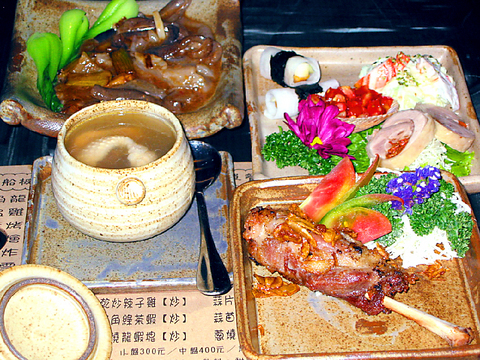Hsieh Li-hsiang (
Almost two years in preparation, the restaurant opened for business three weeks ago.
The exterior, an abstract sculpture of two Tao aborigines performing a frenetic hair dance commands attention of all who pass it; this encloses a massive four-story space that can seat up to 850 diners in comfort, along with a huge collection of iron, driftwood and clay sculptures, and a host of rough stone antiques imported from China.

PHOTO: IAN BARTHOLOMEW, TAIPEI TIMES
Hsieh sees herself primarily as an artist, and insists that the chain of restaurants she now runs, extending across the island, is an excuse to showcase her buildings and art. Fortunately, she has been lucky with her chefs, for the food, which is billed as innovative Taiwanese, is of sufficient quality and generously portioned to keep the punters coming back for more.
The banquet menu at NT$800 for 10 courses is an absolute bargain for big eaters. It is the kind of food you might expect to get at a traditional Taiwanese-style street-side banquet, though as everything is served on rustic crockery that has been designed by Hsieh and is made specifically for her restaurants, the effect is rather more sophisticated.
Display and atmosphere are an important part of the dining experience here, and for those looking to get their first taste of Taiwanese cuisine and social mores, Wu Chiao Chuan Ban is an excellent choice. While the quality of the food is not uniform, and some of the innovations may grate on the sensibilities of purists, the restaurant has established a strong reputation with locals through its outlets in southern Taiwan. Some dishes, such as the rice paste served for desert -- a variation on traditional mochi -- are wildly popular.
The food is certainly prepared with an eye for color and design, and the flavors are definitely robust -- very much in keeping with the rough and restless interior design.
In addition to the regular banquet menu (which requires at least four people), there is also a six-course vegetarian banquet, numerous seasonal specialties and a range of individual dishes that are offered for between NT$300 to NT$500, including a drink and desert.
Whatever else it may be, Wu Chiao Chuan Ban is likely to establish itself in Taipei as firmly as it has elsewhere on the island, and add to the variety of the culinary experience of Taipei's diners.

Towering high above Taiwan’s capital city at 508 meters, Taipei 101 dominates the skyline. The earthquake-proof skyscraper of steel and glass has captured the imagination of professional rock climber Alex Honnold for more than a decade. Tomorrow morning, he will climb it in his signature free solo style — without ropes or protective equipment. And Netflix will broadcast it — live. The event’s announcement has drawn both excitement and trepidation, as well as some concerns over the ethical implications of attempting such a high-risk endeavor on live broadcast. Many have questioned Honnold’s desire to continues his free-solo climbs now that he’s a

Lines between cop and criminal get murky in Joe Carnahan’s The Rip, a crime thriller set across one foggy Miami night, starring Matt Damon and Ben Affleck. Damon and Affleck, of course, are so closely associated with Boston — most recently they produced the 2024 heist movie The Instigators there — that a detour to South Florida puts them, a little awkwardly, in an entirely different movie landscape. This is Miami Vice territory or Elmore Leonard Land, not Southie or The Town. In The Rip, they play Miami narcotics officers who come upon a cartel stash house that Lt. Dane Dumars (Damon)

Francis William White, an Englishman who late in the 1860s served as Commissioner of the Imperial Customs Service in Tainan, published the tale of a jaunt he took one winter in 1868: A visit to the interior of south Formosa (1870). White’s journey took him into the mountains, where he mused on the difficult terrain and the ease with which his little group could be ambushed in the crags and dense vegetation. At one point he stays at the house of a local near a stream on the border of indigenous territory: “Their matchlocks, which were kept in excellent order,

Today Taiwanese accept as legitimate government control of many aspects of land use. That legitimacy hides in plain sight the way the system of authoritarian land grabs that favored big firms in the developmentalist era has given way to a government land grab system that favors big developers in the modern democratic era. Articles 142 and 143 of the Republic of China (ROC) Constitution form the basis of that control. They incorporate the thinking of Sun Yat-sen (孫逸仙) in considering the problems of land in China. Article 143 states: “All land within the territory of the Republic of China shall